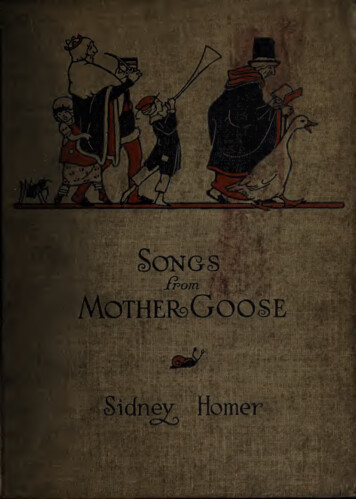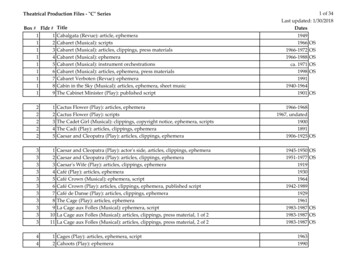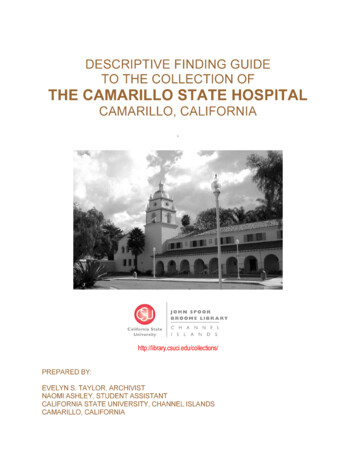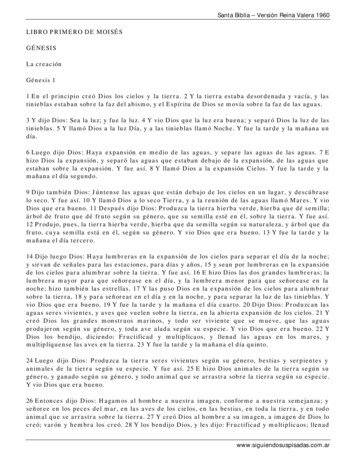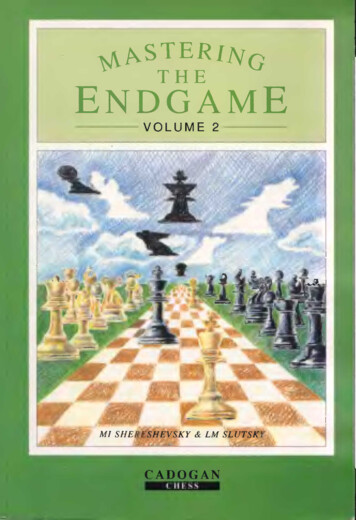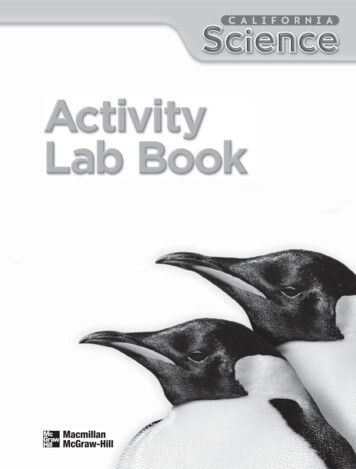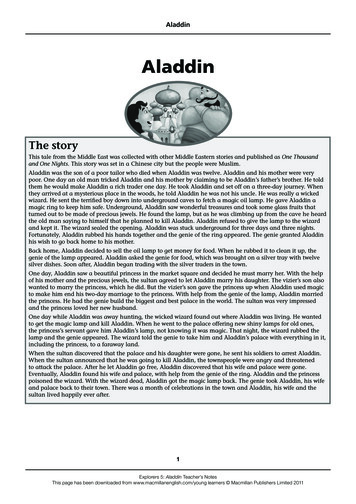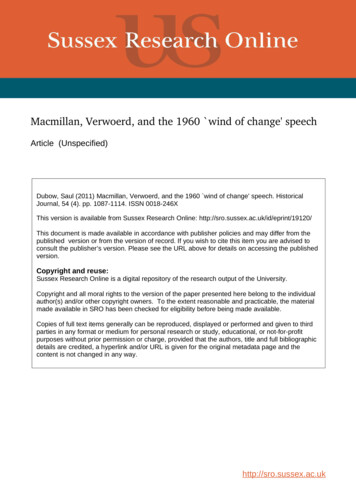
Transcription
Macmillan, Verwoerd, and the 1960 wind of change' speechArticle (Unspecified)Dubow, Saul (2011) Macmillan, Verwoerd, and the 1960 wind of change' speech. HistoricalJournal, 54 (4). pp. 1087-1114. ISSN 0018-246XThis version is available from Sussex Research Online: http://sro.sussex.ac.uk/id/eprint/19120/This document is made available in accordance with publisher policies and may differ from thepublished version or from the version of record. If you wish to cite this item you are advised toconsult the publisher’s version. Please see the URL above for details on accessing the publishedversion.Copyright and reuse:Sussex Research Online is a digital repository of the research output of the University.Copyright and all moral rights to the version of the paper presented here belong to the individualauthor(s) and/or other copyright owners. To the extent reasonable and practicable, the materialmade available in SRO has been checked for eligibility before being made available.Copies of full text items generally can be reproduced, displayed or performed and given to thirdparties in any format or medium for personal research or study, educational, or not-for-profitpurposes without prior permission or charge, provided that the authors, title and full bibliographicdetails are credited, a hyperlink and/or URL is given for the original metadata page and thecontent is not changed in any way.http://sro.sussex.ac.uk
The Historical Journal, , ( ), pp. – Cambridge University Press doi: . /S X ‘MACMILLAN, VERWOERD, AND THE ‘WIND OF CHANGE’ SPEECH*SAUL DUBOWUniversity of SussexJust over fifty years ago, Prime Minister Macmillan made an extensive tour of Africa,culminating in his ‘wind of change’ speech in Cape Town, . This article traces Macmillan’sprogress through Africa with particular emphasis on his intervention in South African politics.It offers a novel reading of the ‘wind of change’ speech, arguing that the message was far moreconciliatory with respect to white South African interests than is usually assumed. Pragmatism ratherthan principle was always the prime consideration. Far from being cowed by Macmillan’s oratory orhis message, Verwoerd stood up to Macmillan and, at least in the eyes of his supporters, gave as goodas he got. The shock of the ‘wind of change’ speech was more evident in Britain and in British settlerregions of Africa than in South Africa. Macmillan’s advisers had an inflated view of the import ofthe speech and in many ways misread Verwoerd’s brand of Afrikaner nationalism. One of theconsequences of the speech was to embolden Verwoerd politically, and to prepare him for thedeclaration of republican status in and departure from the commonwealth.ABSTRACT.Harold Macmillan’s ‘wind of change’ address has gone down in history as oneof the great visionary speeches in post-war history, and perhaps the finest ofMacmillan’s career. As well as signalling a major policy change in respect ofAfrican decolonization, it declared that South Africa was now so far out of stepwith the trajectory of world events that Britain could no longer be counted uponto lend support to apartheid in the international arena. Macmillan’s speechdemonstrated a sweeping grasp of historical circumstance. It was timely in itsassessment of contemporary realities. Its staging was dramatic, and its formalconstruction and delivery magnificent. Yet the power of the address was vitiatedDepartment of History, University of Sussex, Brighton, Sussex BN RH s.dubow@sussex.ac.uk* This paper was written for a conference organized by Sarah Stockwell and Larry Butler onthe fiftieth anniversary of the ‘wind of change’ address, held at the University of East Anglia,March . Papers presented by Simon Ball, Stephen Howe, Joanna Lewis, Roger Louis, andStuart Ward were especially illuminating for my purposes. I have since had very helpfulcomments from Hermann Giliomee, Alex Mouton, Rob Skinner, Andrew Thompson, RichardWhiting, and the anonymous reviewers for the Historical Journal.
SAUL DUBOWby the broad realization that Britain was a declining force in Africa. The speechamounted to concession dressed up as an act of statesmanship, an attempt toregain some sense of domestic control and direction in respect of externalevents that were no longer subject to Britain’s mastery.The significance of Macmillan’s speech had more to do with its recognitionof already existing forces than its originality or its grasp of the future. Indeed,the central message about the force of African nationalism was already a truismwhen Macmillan delivered it – and an understatement at that. Neither the‘wind of change’ metaphor, nor the sentiments it described, were novel. StanleyBaldwin had used a similar phrase to describe the growing forces of nationalismround the world in . In , Macmillan had himself observed that thegrowing nationalisms of Asia and Africa, which had been ‘but a ripple’, was now‘almost a tidal wave’ that had to be guided into ‘broad and safe channels’ lest itturned into communism. His message in was an elaboration of this ideain the specifically African context.In South African historiography, the ‘wind of change’ speech is seldomdiscussed, though routinely noted in passing. One reason is that Macmillan’svisit is compacted into a dramatic series of events. The year beganwith Prime Minister Hendrik Verwoerd’s surprise announcement that areferendum would be held later in the year to decide whether South Africashould become a republic. Macmillan’s ‘wind of change’ speech on Februarywas soon occluded by the Sharpeville massacre and Langa uprisings in March;by the UN Security Council condemnation of apartheid which followed; theattempted assassination of Verwoerd on April; the state of emergency andbanning of the African National Congress (ANC) and Pan-Africanist Congress(PAC); the strongly contested republican referendum in October; and,in December, the controversial World Council of Churches Conference atCottesloe. South Africa’s pressured withdrawal from the commonwealth inMay was the culminating episode in eighteen months of feverish socialtumult, of which Macmillan’s address was merely one event.The success of the speech has to be judged against its objectives. To theextent that it laid a more or less clear exit strategy for Britain as an Africancolonial power – part of Macmillan’s larger attempt to reconfigure Britishattachments to the United States, on the one hand, and Europe, on theother – it largely achieved its purpose. But if part of Macmillan’s intent was topersuade white South Africans to see reason and to abandon the logic of A. Sampson, Mandela: the authorised biography (London, ), p. .Stanley Baldwin, in , spoke of ‘a wind of nationalism and freedom blowing round theworld’ and Nehru, in , referred to ‘strong winds’ ‘blowing all over Asia’. Safire’s political Cape Times, Oct. .dictionary (Oxford, ), p. . Hendrik Verwoerd, academic, newspaper editor, and politician ( – ), became primeminister of South Africa in , having previously served as minister of native affairs. Heelevated apartheid into a full-fledged philosophy in as he laid out a strategy for giving‘self-government’ to newly created ethnic ‘homelands’.
MACMILLAN, VERWOERD,‘WINDOF CHANGE.’ Verwoerdian apartheid dogma, it must be judged a failure. The argument putby Macmillan’s most recent biographer, D. R. Thorpe, that the ‘wind of change’speech marked a ‘key moment in the struggle for black nationalism in SouthAfrica’, and that it was a harbinger of the eventual ending of apartheid,oversimplifies and exaggerates. It perpetuates a myth that can be traced back tothe contemporaneous boast by British High Commissioner John Maud thatMacmillan’s visit was ‘probably the most important event in South Africa sincethe Nationalist Government came to power in ’ and that it would likelydisadvantage the South African government and bolster the opposition. The unintended effect of the speech was to help empower Verwoerd byreinforcing his dominance over domestic politics and by assisting him make twohitherto separate strands of his political career seem mutually reinforcing:republican nationalism on the one hand and apartheid ideology on the other.The speech also helped to precipitate the crisis over South Africa’s membershipof the commonwealth – which was avowedly not Macmillan’s intention. Yet, theconsequence for the commonwealth was inadvertently beneficial for it allowedthe ‘new’ multi-racial commonwealth to be born in the context of a great moralcause. (The paradox here is that since South Africa’s re-entry, the commonwealth has never seemed more lacking in direction.)IMacmillan’s decision to visit sub-Saharan Africa, the first time for a servingBritish prime minister, was arrived at towards the end of . It was a goodtime to go. Following his convincing general electoral victory in October,Macmillan was at last in full control of his cabinet and party. Albeit bruised byhis close involvement in Suez, Macmillan had managed to extricate himselffrom direct responsibility for that debacle. Having endured and now adoptedthe persona of ‘Supermac’, he considered that he now had a free hand toexercise decisive leadership elsewhere. Following the success of his visit tocommonwealth countries in Asia and Australasia, which greatly improved hisstanding at home and abroad, Africa offered an opportunity for Macmillan tosecure his position as an international statesman and even to launch him as a‘prophet of the multi-racial Commonwealth’. Adoption of a coherent African policy was judged vital in a context wherecolonial influence was dissipating and where the ensuing power vacuum invitedAfrican nationalists to seek the support of communists. The fact that Macmillanhad shown only sporadic interest in the continent up till then proved anadvantage for he was relatively unburdened by past association. Africa was rising D. R. Thorpe, Supermac: the life of Harold Macmillan (London, ), pp. , – ; TheNational Archives (TNA), CAB / , dispatch by John Maud, Feb. , in ‘Primeminister’s African tour January–February’, p. . A. Sampson, Macmillan: a study in ambiguity (London, ), p. .
SAUL DUBOWconspicuously up the domestic British agenda, the future of Central Africa inparticular. The Labour party was making independence a campaigning issue,in part because it offered alternative possibilities for the renewal of Britishmoral and political influence in the world. The Conservative party was dividedbetween those, like the ‘Bow Group’, who welcomed or accepted theemergence of independent African nations, and a band of die-hard imperialisttraditionalists, the ‘Rhodesia lobby’, who were determined to stand by kith andkin within the settler colonies. At issue was the future of the ‘greater Britain’idea which had been a defining aspect of British identity for nearly a century.Enoch Powell’s reminder in July of the need to accept moral and politicalresponsibility in respect of African colonial governance was a powerfulchallenge to Macmillan. Operating from rather different assumptions, KwameNkrumah likewise urged the desirability of a consistent statement of Britishintentions. In Iain Macleod, Macmillan had just selected an able and ambitious reformminded young colonial secretary of state who was keen to force the pace ofchange. Macleod’s views were reinforced by ministrations from the mercurialDavid Stirling, war hero and founder of the SAS, now leader of the centralAfrican-based Capricorn Africa Society, who urged the necessity of endorsingnon-racial common citizenship in Africa as a whole. Macleod was keenly awareof the deteriorating political situation in British colonial Africa. The Nyasaland(Malawi) emergency, and the intractable problem of how to hold the CentralAfrican Federation together, was a major concern. In Kenya, the Mau Mauconflict and the revelations of the Hola camp killings exposed British duplicityand continuing complicity with settler racism. In Ghana, independence hadalready been achieved, while in Nigeria it was about to be attained. Seenin this context – and leaving aside other colonial conflagrations beyondBritish responsibility, like Algeria, and the developing crisis in the BelgianCongo – Macmillan underestimated the pace of change. To refer to the ‘wind ofchange’ in the singular rather than the plural was to oversimplify the manydifferent varieties of nationalism already in full display.On November , Macmillan wrote to his powerful and personally loyalcabinet secretary, Norman Brook. He identified a need ‘to lift Africa onto amore national plane as a problem to the solution of which we must all Ibid., p. ; D. Goldsworthy, ‘Conservatives and decolonization: a note on theinterpretation by Dan Horowitz’, African Affairs, ( ), pp. – , at p. ; S. J. Ball,‘Banquo’s ghost: Lord Salisbury, Harold Macmillan, and the high politics of decolonization, – ’, Twentieth-Century British History, ( ), pp. – . R. Ovendale, ‘Macmillan and the wind of change in Africa, – ’, Historical Journal, ( ), pp. – , at pp. , ; Goldsworthy, ‘Conservatives and decolonization’, A. Horne, Macmillan, II: – (Basingstoke, ), pp. – .p. . Ovendale, ‘Macmillan and the wind of change in Africa’, p. . See also B. Phiri,‘The Capricorn Africa Society revisited: the impact of liberalism in Zambia’s colonial history, – ’, International Journal of African Historical Studies, ( ), pp. – .
MACMILLAN, VERWOERD,‘WINDOF CHANGE.’ contribute . . . by some really imaginative effort’. Macmillan had in mind anextended visit analogous to his trip to Asia. His initial idea was to arrangehis visit according to the length of time that particular states had been membersof the commonwealth, starting with South Africa, proceeding directly to Ghana,and somehow working in near and potential commonwealth members likeNigeria, Kenya, and the Central African Federation. This unworkable plan wassoon revised, partly for practical reasons, but also because Verwoerd favouredthe end of January on the grounds that this suited the parliamentary calendar(and, conceivably, because the visit fitted in with his as yet unannounced plan,to announce a referendum on turning South Africa into a republic). SouthAfrica was now to become the final destination of a journey that began in Ghanaand Nigeria, proceeded to the two Rhodesias and Nyasaland, and ended up inSouth Africa by way of the Protectorates. The idea of an African ‘tour’, with its nostalgic associations of a ceremonialroyal progress, is revealing of the late colonial assumptions that infused thepageant. But this was not a leisurely aristocratic excursion undertaken by anEdwardian gentleman and his wife. It was a forward-looking performance ofpolitical theatre designed to seize the political initiative and to mask growingcolonial enfeeblement with strength of resolve. The plot-line was broadly thefollowing: in , proclaimed ‘Africa Year’ by the Labour party as part of aneffort to rebuild the organization following its electoral defeat, a modern Toryleader troops the colours of multi-racialism and demonstrates how Britain canexit Africa stage right as an old-style colonial power; he then re-enters stageleft as first amongst equals in the new commonwealth of nations. Securingpost-colonial goodwill through a reformed commonwealth constituted part ofMacmillan’s nascent ‘Grand Design’ whereby the ‘free world’ could combine(with Britain acting as the key intermediary between the United States, andEurope) to withstand the threat of global communism. Accounts of the tour, including photographic records, show a mostly relaxedMacmillan meeting political and civic dignitaries, visiting development projectssuch as the Volta River dam site and the Tema harbour in Ghana, whilepersonally greeting African politicians variously attired in suits and traditionaldress. The welcoming crowds were rather smaller than anticipated. In timehonoured proconsular manner, Macmillan professed delight at West Africa’s‘colourful scene’ and the glorious welcomes extended by Accra market’s C. Baker, ‘Macmillan’s “wind of change” tour, ’, South African Historical Journal, ( ), pp. – , at p. ; R. Hyam, Britain’s declining empire: the road to decolonisation, – (Cambridge, ), p. . Baker, ’Macmillan’s “Wind of Change” tour’, p. . C. Gurney, ‘“A great cause”: the origins of the anti-apartheid movement, June –March ’, Journal of Southern African Studies, ( ), pp. – , at p. . Thorpe, Supermac, pp. – ; J. G. Giauque, Grand designs and visions of unity: the Atlanticpowers and the reorganization of Western Europe, – (Charlotte, NC, ), p. .
SAUL DUBOW‘famous “mammies”’. Lady Dorothy meanwhile busied herself with visits toschools and clinics. Macmillan was charmed by a genial Kwame Nkrumah,notwithstanding the Ghanaian leader’s public denunciation of colonialism asan ‘anachronism’ which should ‘cease’. At a state banquet in Accra, Macmillanacknowledged the ‘strong tide of feeling among Africans that this is a time ofdestiny’. He also spoke of ‘the wind of change [blowing] right through Africa’.Yet, the phrase was not picked up by journalists, perhaps because it seemed tobe little more than ‘a statement of the obvious’. At the University of Ibadan, Nigeria, Macmillan was surprised – without beingunduly discomfited – when students displayed placards such as ‘Macbutcher GoHome’. In Blantyre, where the government state of emergency was in full force,Macmillan encountered demonstrations against Federation. Protestors boreplacards demanding the release from detention of Dr Banda, whose continuedimprisonment was a major point of contention. In Livingstone, Macmillanalso encountered crowd anger; he was undeterred when a crude gelignite bombwas found in the Savoy Hotel, Ndola, shortly before he was due to address anaudience. The political tensions of Central Africa were expressed even morevolubly in Salisbury. Here, Macmillan was forced to deny a statement he hadmade in Lagos that was taken as casting doubt on the future of Federation.Lengthy meetings with forceful characters like Roy Welensky, prime minister ofthe Federation, did not make Macmillan’s visit any easier. That Macmillan should find himself involved in difficult bouts of mediationin Central Africa was unavoidable given that the future of the Federation wasnow Britain’s most pressing and intractable African problem. In South Africa,by contrast, Macmillan was the guest of a sovereign state, a fact that his hostsmade emphatically clear. As Norman Brook’s record of Macmillan’s report tocabinet makes clear, Britain bore responsibility for the central African region,though it possessed ‘no power – only influence’. In South Africa, by contrast,Britain’s task was to ‘concentrate on our agreements’, ‘to keep them with us’,and to hold the commonwealth together. The language of friendship,hospitality, and mutuality was one that the British and the South Africansboth employed in recognition of the fact that the awkward discussions betweenMacmillan and Verwoerd were being conducted between the leaders ofindependent states. H. Macmillan, Pointing the way, – (London, ), p. .D. Hunt, On the spot: an ambassador remembers (London, ), p. ; TNA, CAB / , ‘Prime minister’s African tour’, p. . Macmillan, Pointing the way, p. ; Illustrated London News, Feb. ; Sampson,Macmillan, pp. – ; Horne, Macmillan, p. ; Guardian, Jan. . Guardian, Jan. . Illustrated London News, Feb. and Feb. ; Die Transvaler, Jan. . TNA, CAB / , cabinet secretary notebooks, extract from cabinet meeting, Feb. . My thanks to Tessa Stirling for extracts from cabinet minutes and other material in TNA.
MACMILLAN, VERWOERD,‘WINDOF CHANGE.’ IIMacmillan chose Cape Town as the place to claim the moral high ground byrenouncing racial rule and distancing the British government from apartheid.South African whites were ostensibly the primary audience, yet the speech wasgeared to a much wider set of constituencies. It was intended to signal a majorpolicy shift on Africa to Macmillan’s political constituency at home and toan international audience (the United States especially) that was increasinglyimpatient with Britain’s continuing involvement as a colonial power. Equallyimportantly, the message was directed to whites in central and eastern Africa,and also to newly independent Africa where apartheid was increasinglyregarded as a symbol of colonial subjection. Macmillan’s initiative was a boldand clever attempt to address multiple audiences and the speech was writtenand delivered with consummate skill. Whether it worked out as intended – or asclaimed – is another matter.There were few intimations at the start of Macmillan’s South African visit thathe would raise controversy. Arriving in Johannesburg on January , hewas met by the debonair British high commissioner, Sir John Maud, andaccompanied throughout his visit by South Africa’s dour minister of external/foreign affairs and representative to the United Nations, Eric Louw, whosepresence was a constant source of tension. An aggressive nationalist who hadexhibited strong fascist sympathies during the war and excelled in rabblerousing anti-Semitism, Louw was happy to act as Prime Minister HendrikVerwoerd’s ‘chief hatchet man’. Louw was a pugnacious defender of SouthAfrica’s interests and, unusually for a senior diplomat, did not seem to thinkthat charm was a necessary part of the profession’s weaponry. Macmillan’s visit was carefully managed by his hosts. Ever keen to portray theapartheid dystopia to best effect, the South African prime minister arranged forhis guests to visit the new model African township of Meadowlands where he wasentertained in the police station. It was to this (misleadingly named) ‘Bantulocation’ that many victims of the Sophiatown urban clearances had recentlybeen removed. A group of protesters paraded banners: ‘Please visit our leaders’;‘Apartheid is dead, not even Mac can save it’. At the new homeland university ofTurfloop in the northern Transvaal, an uncomfortable-looking Macmillan hada leopard skin kaross pinned to his suit while being invested with the authorityof a Bantu chief. The Sekukuni paramount chief (more likely a juniorfunctionary pretending to be the paramount) addressed him: ‘Now you seefor yourself – we do not live in chains!’ The discordant artificiality of this stagedexercise in Verwoerdian tribalism was heightened by a performance of Purcell’s F. Myers, ‘Harold Macmillan’s “winds of change” speech: a case study in the rhetoric ofpolicy change’, Rhetoric and Public Affairs, ( ), pp. – , at pp. – . Sampson, Macmillan, p. . Ibid., p. ; D. Eisenberg, ‘The Commonwealth Conference’, Africa South, ( ),p. .
SAUL DUBOW‘Nymphs and sheperds’ put on by a Sotho girl choir. Macmillan also visitedthe sacralized Voortrekker Monument and he was taken down a mineshaft atWest Driefontein. In his autobiography, Macmillan records that he was able tomeet ‘many representatives of different points of view’ on the Rand, but thisdoes not appear to have extended beyond English-speaking opinion formerslike the industrialist Harry Oppenheimer and the editor of the eveningJohannesburg newspaper, The Star. Macmillan complained of excessive securityarrangements. Macmillan arrived in Cape Town on February. He was met at the airport byVerwoerd and applauded by a crowd of , , some of whom waved UnionJacks. A small group of welcoming Africans were stationed in the airport’s‘non-European’ enclosure. Cordial words were exchanged on the tarmacbetween the two leaders: Macmillan spoke about the commonwealth connection while Verwoerd welcomed his counterpart as the prime minister of a‘friendly nation’ and as someone who might become a personal friend. Macmillan stayed with Verwoerd at the prime minister’s official residence atGroote Schuur, an estate set in large grounds below Table Mountain, which hadbeen designed by Herbert Baker in vernacular Cape Dutch style for CecilRhodes. Whereas Rhodes’s predelictions led him to employ an all-male staff,Verwoerd made a point of having no blacks in the house: the Macmillans wereduly assigned an ‘old and incompetent Dutch butler’. Macmillan found thehouse ‘strangely grim’. At Groote Schuur, Macmillan had extended private discussions withVerwoerd, along with Eric Louw, Norman Brook, and the ex-Oxford politicsdon, now British high commissioner, John Maud. Macmillan reported thatVerwoerd spoke in a quiet voice, suggesting reasonableness, but that he wasentirely unyielding. To Macmillan, the high-church Anglican, Verwoerd wasunpleasantly reminiscent of the Scottish Presbyterian, John Knox. The SouthAfrican prime minister’s overbearing self-confidence, coupled with his slightinsecurity as a Hollander-turned-Afrikaner, frequently manifested itself in aninsistent willingness to explain his policies at great length and with the pedantryof an academic who was accustomed to being listened to. Perhaps he wasapplying the lessons of his doctoral thesis in experimental psychologytitled the ‘Blunting of the emotions’. Its key point was that emotional responsescould be manipulated by means of incessant repetition of particular stimuli –which in the case of Verwoerd’s academic experiments entailed subjectingindividuals to various colour combinations, and punishing or rewarding themappropriately. Hunt, On the spot, p. ; Guardian, Jan. ; TNA, CAB / , ‘Prime minister’s Macmillan, Pointing the way, pp. – .African tour’, p. . Cape Times, Feb. .Macmillan, Pointing the way, p. . H. F. Verwoerd, ‘A method for the experimental production of emotions’, AmericanJournal of Psychology, ( ), pp. – .
MACMILLAN, VERWOERD,‘WINDOF CHANGE.’ At a garden party hosted on February by John Maud, Macmillan was able tospeak to white liberal opponents of apartheid like the Anglican archbishop,Joost de Blank, Patrick Duncan, and Margaret Ballinger. The IllustratedLondon News printed a picture of the occasion revealing a tense high table withan empty seat for Macmillan – who had meanwhile slipped away to confer withBallinger on an outdoor sofa. The Daily Telegraph commented that ‘that thisstrikingly ostentatious display of interest in Liberal opinion was designed as aconsolation prize for the failure to see representatives of African opinion’. The Guardian quoted sources suggesting that Macmillan was virtually a prisonerof Verwoerd’s and that he was ‘irritated’ at not being given the opportunity toconsult with genuine African leaders. David Hunt, who accompaniedMacmillan throughout his Africa tour, made a similar point, emphasizingLouw’s opposition to Macmillan meeting African nationalists. In seeking ameeting with the prime minister, the ANC expressed anxiety that the SouthAfrican government would use the occasion to ‘quell the mounting worldwidecondemnation of their racialistic and oppressive policies’. The non-racialLiberal party likewise sought an interview with Macmillan. Hunt recorded thatthe prime minister was himself willing to see ‘these people’ if the governmentdid not object. Macmillan had indeed met a range of African nationalistselsewhere on the continent but there is no compelling evidence to suggest thathe or the British high commission had tried hard to effect similar meetings inSouth Africa; the official record displays a measure of defensiveness on thiscount, not least because it was anticipated that the issue would be takenup by the press and in the British parliament. Macmillan’s attempts to getVerwoerd to take public responsibility for preventing him seeing the ANC andthe Liberal party were rebuffed by Louw. The (tacitly) agreed formula was thatMacmillan would meet only with the parliamentary opposition and it was onthese grounds that the British prime minister declined to meet a deputationfrom the ANC. Fear of offending their hosts was the major reason, but consular insularity wasperhaps just as significant. Patrick Duncan reportedly found the prime minister‘suddenly deaf ’ when he urged Macmillan to seek out black leaders at Maud’swhites-only garden party. Anthony Sampson added, pertinently, that the high Cape Times, Feb. .Cited in Cape Times, Feb. ; also Sampson, Macmillan, p. . Guardian, Feb. . Hunt, On the spot, p. ; ‘Letter from DWS Hunt (CRO) to Sir A. Clutterbuck giving hispersonal impressions’ of Macmillan’s Cape Town speech, Feb. , doc. , in R. Hyamand W. R. Louis, eds., The Conservative government and the end of empire, – , Part II SeriesA Vol. (London, ), p. ; TNA, PREM / , D. Nokwe (ANC secretary-general) toMacmillan, Jan. , and Peter Brown (chair Liberal party) to Macmillan, Jan. . TNA, CAB / , ‘Prime minister’s Africa tour’, pp. , – ; TNA, PREM / , J. B. Johnston to high commissioner, Jan. , Macmillan to D. Nokwe, Feb. ; Maud to Bligh, Jan. .
SAUL DUBOWcommission knew little about the African leadership. Notwithstanding theheavily publicized treason trial of anti-apartheid activists and the DefianceCampaign which preceded it, all indications are that British diplomats had littleappreciation of the importance or depth of extra-parliamentary politicalopposition, and little inclination to find out. John Maud’s confidential postspeech report in which he remarked that ‘the slogan-bearing campaignannounced by the African National Congress’ proved ‘a flop’, does not suggestundue disappointment. In assessing
Harold Macmillan’s ‘wind of change’ address has gone down in history as one of the great visionary speeches in post-war history, and perhaps the finest of Macmillan’s career. As well as signalling a major policy change in respect of African decolonization,
